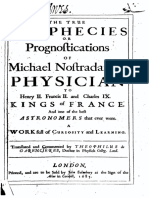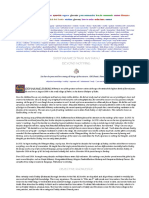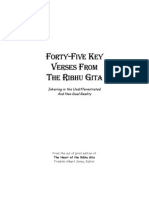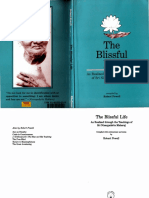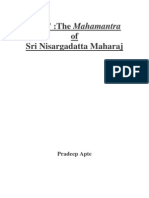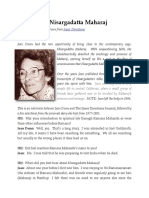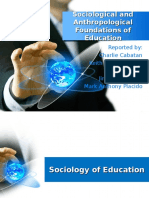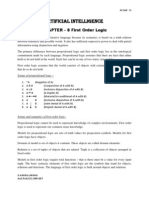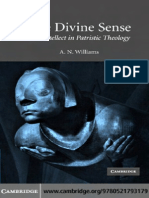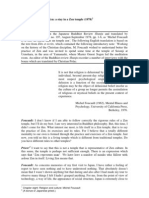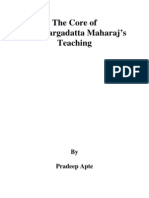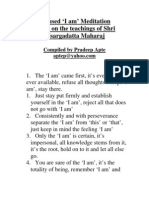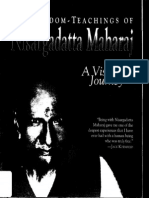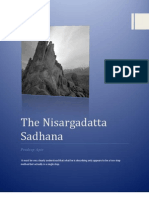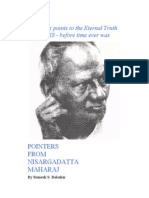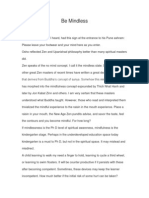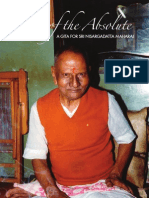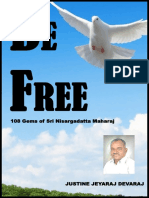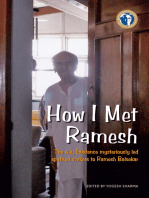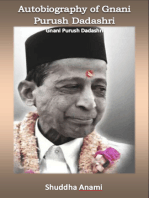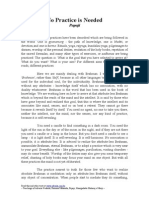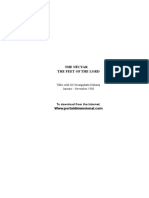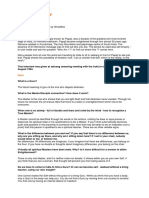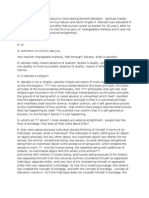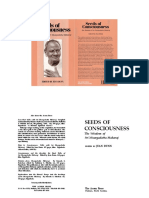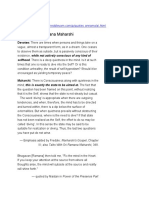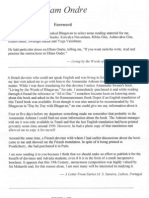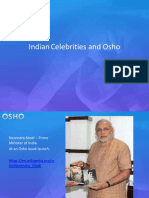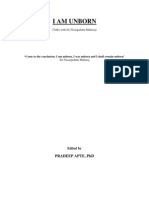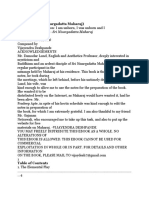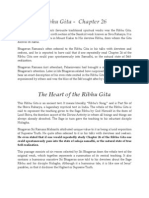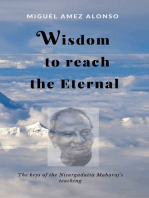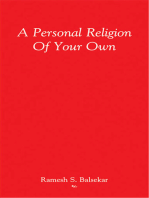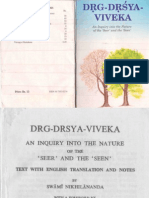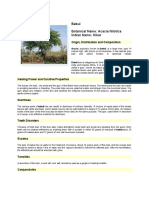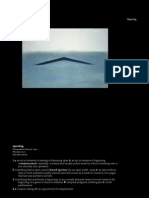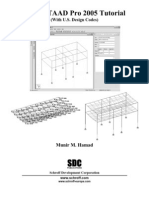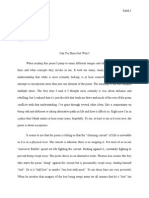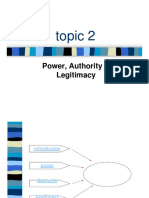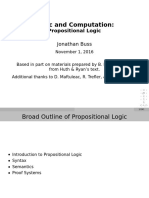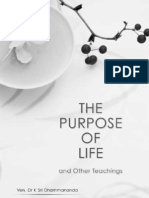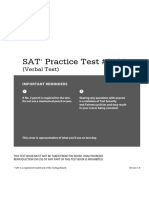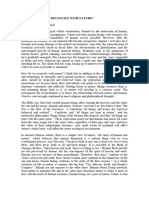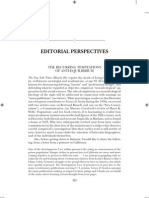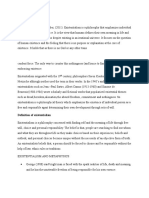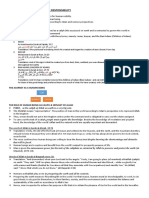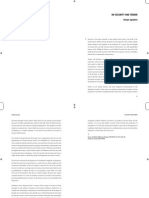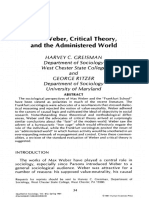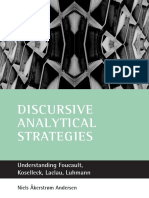100%(1)100% found this document useful (1 vote)
524 views200 Quotes Nisargadatta
200 Quotes Nisargadatta
Uploaded by
anurag shahiNisargadatta encourages focusing inward through meditation and self-inquiry to discover one's true nature beyond thoughts and sensations. He advises examining the mechanisms of confusion and desires in order to understand and overcome them. Pursuing peace requires living an integrated life without disturbing others or one's own mind through renouncing desires and fears that cause restlessness.
Copyright:
Attribution Non-Commercial (BY-NC)
Available Formats
Download as DOC, PDF, TXT or read online from Scribd
200 Quotes Nisargadatta
200 Quotes Nisargadatta
Uploaded by
anurag shahi100%(1)100% found this document useful (1 vote)
524 views25 pagesNisargadatta encourages focusing inward through meditation and self-inquiry to discover one's true nature beyond thoughts and sensations. He advises examining the mechanisms of confusion and desires in order to understand and overcome them. Pursuing peace requires living an integrated life without disturbing others or one's own mind through renouncing desires and fears that cause restlessness.
Copyright
© Attribution Non-Commercial (BY-NC)
Available Formats
DOC, PDF, TXT or read online from Scribd
Share this document
Did you find this document useful?
Is this content inappropriate?
Nisargadatta encourages focusing inward through meditation and self-inquiry to discover one's true nature beyond thoughts and sensations. He advises examining the mechanisms of confusion and desires in order to understand and overcome them. Pursuing peace requires living an integrated life without disturbing others or one's own mind through renouncing desires and fears that cause restlessness.
Copyright:
Attribution Non-Commercial (BY-NC)
Available Formats
Download as DOC, PDF, TXT or read online from Scribd
Download as doc, pdf, or txt
100%(1)100% found this document useful (1 vote)
524 views25 pages200 Quotes Nisargadatta
200 Quotes Nisargadatta
Uploaded by
anurag shahiNisargadatta encourages focusing inward through meditation and self-inquiry to discover one's true nature beyond thoughts and sensations. He advises examining the mechanisms of confusion and desires in order to understand and overcome them. Pursuing peace requires living an integrated life without disturbing others or one's own mind through renouncing desires and fears that cause restlessness.
Copyright:
Attribution Non-Commercial (BY-NC)
Available Formats
Download as DOC, PDF, TXT or read online from Scribd
Download as doc, pdf, or txt
You are on page 1of 25
200 Quotes Nisargadatta
The following are all quotes by
Nisargadatta Maharaj
unless the word questioner appears before the quote.
All of the quotes come from the book
"I AM THAT". The quotes are presented in the order
in which they appear in the book.
Nisargadatta said:
1. "Go deep into the sense of 'I am'
and you will find.
How do you find a thing you have mislaid or forgotton?
You keep it in your mind until you recall it.
The sense of being, of 'I am' is the first to emerge.
Ask yourself whence it comes,
or just watch it quietly.
When the mind stays in the 'I am', without moving,
you enter a state that cannot be verbalized
but can be experienced.
All you need to do is to try and try again."
2. "I see what you too could see, here and now,
but for the wrong focus of your attention.
You give no attention to your self.
Your mind is all with things, people and ideas,
never with your self.
Bring your self into focus,
become aware of your own existence.
See how you function,
watch the motives and results of your actions.
Study the prison you have built around yourself,
by inadvertence."
3. "We discover it by being earnest,
by searching, inquiring,
questioning daily and hourly,
by giving one's life to this discovery."
4. "Look at the net and its many contradictions.
You do and undo at every step.
You want peace, love, happiness
and work hard to create pain, hatred and war.
You want longevity and overeat,
you want friendship and exploit.
See your net as made of such contradictions
and remove them --
your very seeing will make them go."
5. "How do you go about finding anything?
By keeping your mind and heart on it.
Interest there must be and steady remembrance.
To remember what needs to be remembered
is the secret of success.
You come to it through earnestness"
6. "What is supremely important is to be free
from contradictions:
the goal and the way must not be on different levels;
life and light must not quarrel;
behaviour must not betray belief.
Call it honesty, integrity, wholeness;
you must not go back, undo, uproot,
abandon the conquered ground.
Tenacity of purpose and honesty in pursuit
will bring you to your goal."
7. "Take the first step first.
All blessings come from within. Turn within.
'I am' you know.
Be with it all the time you can spare,
until you revert to it spontaneously.
There is no simpler and easier way."
8. "We know the outer world of sensations and actions,
but of our inner world of thoughts and feelings
we know very little.
The primary purpose of meditation is to
become conscious of, and familiar with,
our inner life.
The ultimate purpose is to reach the source of life
and consciousness.
Incidentally, practice of meditation affects
deeply our character.
We are slaves to what we do not know;
of what we know we are masters.
Whatever vice or weakness in ourselves
we discover and understand its causes
and its workings, we overcome it by the very knowing;
the unconscious dissolves when brought into
the conscious.
The dissolution of the unconscious releases energy;
the mind feels adequate and becomes quiet."
9. "It is not so much the matter of levels
as of gunas (qualities).
Meditation is a sattvic (pure, true) activity
and aims at complete elimination of
tamas (inertia) and rajas (motivity, activity).
Pure sattva (harmony) is perfect freedom
from sloth and restlessness."
10. Questioner: "Since I cannot improve sattva,
am I to deal with tamas and rajas only?
How do I deal with them?"
Nisargadatta: "By watching their influence in you
and on you.
Be aware of them in operation,
watch their expression in your thoughts,
words and deeds, and gradually their grip on you
will lessen and the clear light of sattva will emerge."
11. "Refuse all thoughts except one:
the thought 'I am'.
The mind will rebel in the beginning,
but with patience and perserverance
it will yield and keep quiet."
12. "True happiness cannot be found in things
that change and pass away.
Pleasure and pain alternate inexorably.
Happiness comes from the self
and can be found in the self only.
Find your real self (swarupa)
and all else will come with it."
13. "Every pleasure, physical or mental,
needs an instrument.
Both the physical and mental instruments are material,
they get tired and worn out.
The pleasure they yield is necessarily limited
in its intensity and duration.
Pain is the background of all your pleasures.
You want them because you suffer.
On the other hand, the very search for pleasure
is the cause of pain. It is a vicious circle."
14. Questioner: "I can see the mechanism of my
confusion, but I do not see my way out of it."
Nisargadatta: "The very examination of the mechanism
shows the way.
After all, your confusion is only in your mind,
which never rebelled so far against confusion
and never got to grips with it.
It rebelled only against pain."
15. "Be alert. Question, observe, investigate,
learn all you can about confusion,
how it operates, what it does to you and others.
By being clear about confusion you become clear
of confusion."
16. "By elminating the intervals of inadvertance
during the waking hours you will gradually eliminate
the long interval of absent-mindedness,
which you call sleep.
You will be aware that you are asleep."
17. "You can have for the asking
all the peace you want"
Questioner: "I am asking."
Nisargadatta: "You must ask with an undivided heart
and live an integrated life."
Questioner: "How?"
Nisargadatta: "Detach yourself from all that makes
your mind restless.
Renounce all that disturbs its peace.
If you want peace, deserve it."
Questioner: "Surely everybody deserves peace"
Nisargadatta: "Those only deserve it,
who don't disturb it."
Questioner: "In what way do I disturb peace?"
Nisargadatta: "By being a slave
to your desires and fears."
Questioner: "Even when they are justified?"
Nisargadatta: "Emotional reactions,
born of ignorance or inadvertance,
are never justified.
Seek a clear mind and a clean heart.
All you need is to keep quietly alert,
inquiring into the real nature of yourself.
This is the only way to peace."
18. "All these sufferings are man-made
and it is within man's power to put an end to them.
God helps by facing man with the results of his
actions and demanding that the balance
should be restored.
Karma is the law that works for righteousness;
it is the healing hand of God."
19. "Use your mind. Remember. Observe.
You are not different from others.
Most of their experiences are valid for you too.
Think clearly and deeply,
go into the structure of your desires
and their ramifications.
They are a most important part of your mental
and emotional make-up
and powerfully affect your actions.
Remember, you cannot abandon what you do not know.
To go beyond yourself, you must know yourself."
20. "Purify yourself by a well-ordered
and useful life.
Watch over your thoughts, feelings, words
and actions.
This will clear your vision."
21. Questioner: "Well, you told me that
I am the Supreme Reality. I believe you.
What next is there for me to do?"
Nisargadatta: "I told you already.
Discover all that you are not.
Body, feelings, thoughts, ideas, time, space,
being and not-being, this or that -- nothing
concrete or abstract you can point out to is you.
A mere verbal statement will not do --
you may repeat a formula endlessly
without any result whatsoever.
You must watch yourself continuously --
particularly your mind -- moment by moment,
missing nothing. This witnessing is essential
for the separation of the self from the not-self."
22. Questioner: "What about witnessing the witness"
Nisargadatta: "Putting words together will not
take you far. Go within and discover
what you are not. Nothing else matters."
23. "Since it is awareness that makes
consciousness possible, there is awareness in every
state of consciousness. Therefore, the very
consciousness of being conscious is already a
movement in awareness. Interest in your stream
of consciousness takes you to awareness.
It is not a new state. It is at once recognized
as the original, basic existence,
which is life itself, and also love and joy."
24. "Realization is but the opposite of ignorance.
To take the world as real
and one's self as unreal is ignorance,
the cause of sorrow. To know the self as the
only reality and all else as temporal and transient
is freedom, peace and joy. It is all very simple
instead of seeing things as imagined, learn to see
them as they are. When you can see everything
as it is, you will also see yourself as you are.
It is like cleansing a mirror.
The same mirror that shows you the world as it is,
will also show you your own face.
The thought 'I am' is the polishing cloth. Use it."
25. "Devotion to your goal makes you live a clean
and orderly life, given to the search for truth
and to helping people, and realization makes
noble virtue easy and spontaneous,
by removing for good the obstacles in the shape of
desires and fears and wrong ideas."
26. "The entire purpose of a clean
and well-ordered life is to liberate man
from the thaldrom of chaos and the burden of sorrow."
27. "in reality only the Ultimate is.
The rest is a matter of name and form.
And as long as you cling to the idea
that only what has name and shape exists,
the Supreme will appear to you non-existing.
When you understand that names and shapes
are hollow shells without any content whatsoever,
and what is real is nameless and formless,
pure energy of life and light of consciousness,
you will be at peace -- immersed in the deep
silence of reality."
28. "All will happen as you want it,
provided you really want it."
29. "Within the prison of your world appears a man
who tells you that the world of
painful contradictions, which you have created,
is neither continuous nor permanent
and is based on a misaprehension.
He pleads with you to get out of it,
by the same way by which you got into it.
You got into it by forgetting what you are
and you will get out of it
by knowing yourself as you are."
30. "Why not turn away from the experience
to the experiencer and realize the full import
of the only true statement you can make: 'I am'?"
31. "Just keep in mind the feeling 'I am',
merge in it, till your mind and feeling become one.
By repeated attempts you will stumble on the
right balance of attention and affection
and your mind will be firmly established
in the thought-feeling 'I am'. "
32. Questioner: "Then what is needed?"
Nisargadatta: "Distrust your mind, and go beyond."
Questioner: "What shall I find beyond the mind?"
Nisargadatta: "The direct experience of being,
knowing and loving."
Questioner: "How does one go beyond the mind?"
Nisargadatta: "There are many starting points -
they all lead to the same goal.
You may begin with selfless work,
abandoning the fruits of action;
you may then give up thinking
and in the end give up all desires.
Here, giving up (tyaga) is the operational factor.
Or you may not bother about anything you want,
or think, or do and just stay put in the
thought and feeling 'I am", focussing 'I am" firmly
in your mind. All kind of experience may come to
you -- remain unmoved in the knowledge that
all perceivable is transient,
and only the 'I am' endures."
33. Questioner: "The inner teacher is not
easily reached."
Nisargadatta: "Since he is in you and with you,
the difficulty cannot be serious.
Look within and you will find him."
Questioner: "When I look within, I find sensations
and perceptions, thoughts and feelings,
desires and fears, memories and expectations.
I am immersed in this cloud and see nothing else."
Nisargadatta: "That which sees all this,
and the nothing too, is the inner teacher.
He alone is, all else only appears to be.
He is your own self (swarupa),
your hope and assurance of freedom;
find him and cling to him
and you will be saved and safe."
34. "Seeing the false as false,
is meditation. This must go on all the time."
35. "Deliberate daily exercise in discrimination
between the true and the false
and renunciation of the false is meditation."
36. "I can tell you about myself.
I was a simple man, but I trusted my Guru.
What he told me to do, I did.
He told me to concentrate on 'I am' - I did.
He told me that I am beyond all perceivables
and conceivables -- I believed.
I gave him my heart and soul, my entire attention
and the whole of my spare time
(I had to work to keep my family alive).
As a result of faith and earnest application,
I realized my self (swarupa) within three years."
37. "Establish yourself in the awareness of 'I am'.
This is the beginning and also the end
of all endeavour."
38. "Meditation will help you to find your bonds,
loosen them, untie them and cast your moorings."
39. "To solve a problem you must trace it
to its source. Only in the dissolution of the
problem in the universal solvents of
inquiry and dispassion,
can its right solution be found."
40. "Why don't you inquire how real
are the world and the person?"
41. Nisargadatta: "Because of you, there is a world"
Questioner: "To me such statement
appears meaningless."
Nisargadatta: "Its meaninglessness may disappear
on investigation."
42. "To know what you are, you must first
investigate and know what you are not.
And to know what you are not
you must watch yourself carefully,
rejecting all that does not necessarily go with
the basic fact: 'I am'.
The ideas: I am born at a given place,
at a given time, from my parents and now
I am so-and-so, living at, married to, father of,
employed by, and so on,
are not inherent in the sense 'I am'.
Our usual attitude is of 'I am this'.
Separate consistently and perserveringly
the 'I am' from 'this' or 'that',
and try to feel what it means to be, just to be,
without being 'this' or 'that'.
All our habits go against it and the task of
fighting them is long and hard sometimes,
but clear understanding helps a lot.
The clearer you understand that on the level
of the mind you can be described in negative
terms only, the quicker you will come to the end
of your search and realize your limitless being."
43. "When things repeatedly happen together,
we tend to see a causal link between them.
It creates a mental habit,
but a habit is not a necessity."
44. "False ideas about this 'I am' lead to bondage,
right knowledge leads to freedom and happiness."
45. "It is solid, steady, changless, beginingless
and endless, ever new, ever fresh."
Questioner: "How is it reached?"
Nisargadatta: "Desirelessness and fearlessness
will take you there."
46. "The sense 'I am' is your own.
You cannot part with it,
but you can impart it to anything,
as in saying: 'I am young, I am rich, etc.'
But such self-identifications are patently false
and the cause of bondage."
47. "The Supreme is the easiest to reach
for it is your very being.
It is enough to stop thinking and desiring anything,
but the Supreme."
48. "By forgetting who you are and imagining
yourself a mortal creature, you created so much
trouble for yourself that you have to wake up,
like from a bad dream.
Inquiry also wakes you up."
49. "Truth is simple and open to all.
Why do you complicate?
Truth is loving and lovable.
It includes all, accepts all, purifies all.
It is untruth that is difficult
and a source of trouble.
It always wants, expects, demands.
Being false, it is empty, always in search of
confirmation and reassurance.
It is afraid of and avoids inquiry.
It identifies itself with any support,
however weak and momentary. Whatever it gets,
it loses and asks for more."
50. Questioner: "What is permanent?"
Nisargadatta: "Look to yourself for the permanent.
Dive deep within and find what is real in you."
Questioner: "How to look for myself?"
Nisargadatta: "Whatever happens it happens to you.
What you do, the doer is in you.
Find the subject of all that you are as a person."
Questioner: "What else can I be?"
Nisargadatta: "Find out. Even if I tell you that
you are the witness, the silent watcher,
it will mean nothing to you, unless you find the
way to your own being."
Questioner: "My question is: How to find the way
to one's own being?"
Nisargadatta: "Give up all questions except one:
'Who am I?' After all,
the only fact you are sure of is that you are.
The 'I am' is certain. The 'I am this' is not.
Struggle to find out what you are in reality."
51. "'I am' itself is God.
The seeking itself is God.
In seeking you discover that you are neither
the body nor the mind, and the love of the self
in you is for the self in all. The two are one.
The consciousness in you and the consciousness in me,
apparently two, really one,
seek unity and that is love."
52. Questioner: "How am I to find that love?"
Nisargadatta: "What do you love now? The 'I am'.
Give your heart and mind to it,
think of nothing else."
53. "All desire has its source in the self.
It is all a matter of choosing the right desire."
54. Nisargadatta: "All these questions arise
from your believing yourself to be a person.
Go beyond the personal and see."
55. "I ask you only to stop imagining
that you were born, have parents, are a body,
will die and so on.
Just try, make a beginning --
it is not as hard as you think."
56. "Whatever you do against your better knowledge
is sin"
57. "Remembering yourself is virtue,
forgetting yourself is sin."
58. "When you shall begin to question your dream,
awakening will not be far away."
59. "Steady faith is stronger than destiny.
Destiny is the result of causes, mostly accidental,
and is therefore loosely woven.
Confidence and good hope will overcome it easily."
60. Questioner: "In Europe there is no tradition of
a mantra, except in some contemplative orders.
Of what use is it to a modern day young Westerner?"
Nisargadatta:"None, unless he is very much attracted
. For him the right procedure is to adhere to the
thought that he is the ground of all knowledge,
the immutable and perennial awareness of all
that happens to the senses and mind.
If he keeps it in mind all the time, aware and alert,
he is bound to break the bounds of non-awareness
and emerge into pure life, light and love.
The idea - 'I am the witness only'
will purify the body and the mind
and open the eye of wisdom.
Then man goes beyond illusion
and his heart is free of all desires.
Just like ice turns to water and water to vapour,
and vapour dissolves in air
and disappears into space,
so does the body dissolve into pure awareness
(chidakash), then into pure being (paramakash),
which is beyond all existence and non-existence."
61. "You should consider more closely
your own world, examine it critically and,
suddenly, one day you will find yourself in mine."
62. "See your world as it is,
not as you imagine it to be.
Discrimination will lead to detachment;
detachment will ensure right action,
right action will build the inner bridge
to your real being.
Action is proof of earnestness.
Do what you are told diligently and faithfully
and all obstacles will disolve."
63. "Investigate your world,
apply your mind to it, examine it critically,
scrutinize every idea about it; that will do."
64. "The entire universe of pain
is born of desire.
Give up the desire for pleasure
and you will not even know what is pain."
65. "By its very nature pleasure is limited
and transient. Out of pain desire is born,
in pain it seeks fulfilment, and it ends in
the pain of frustration and despair.
Pain is the background of pleasure,
all seeking of pleasure if born in pain
and ends in pain."
66. "sorting out and discarding (viveka-vairagya)
are absolutely necessary.
Everything must be scrutinized
and the unnecessary ruthlessly destroyed.
Believe me, there cannot be too much destruction.
For in reality nothing is of value.
Be passionately dispassionate - that is all."
67. "When trough the practice of discrimination
and detachment (viveka-vairagya),
you lose sight of sensory and mental states,
pure being emerges as the natural state."
68. Questioner: "How does one bring to an end
this sense of separateness?"
Nisargadatta: "By focusssing the mind on 'I am',
on the sense of being. 'I am so-and-so' dissolves,
'am a witness only' remains and that too
submerges in 'I am all'. Then the all becomes
the One and the One - yourself,
not separate from me.
Abandon the idea of a separate 'I'
and the question of 'whose experience?'
will not arise."
69. "Dive deep within yourself
and you will find it easily and simply.
Go in the direction of 'I am'."
70. "To know the world you forget the self -
to know the self you forget the world.
What is the world after all?
A collection of memories.
Cling to one thing, that matters,
hold on to 'I am' and let go all else.
This is sadhana."
71. Questioner: "I do not feel the world
is the result of a mistake."
Nisargadatta: "You may say so only after a full
investigation, not before. Of course, when you
discern and let go all that is unreal,
what remains is real."
72. "Be fully aware of your own being
and you will be in bliss consciously.
Because you take your mind off yourself and make
it dwell on what you are not, you lose
your sense of well-being, of being well."
73. Questioner: "There are two paths before us
the path of effort (yoga marga),
and the path of ease (bhoga marga).
Both lead to the same goal - liberation."
Nisargadatta: "Why do you call bhoga a path?"
How can ease bring you perfection?"
Questioner: "The perfect renouncer (yogi)
will find reality. The perfect enjoyer (bhogi)
also will come to it."
Nisargadatta: "How can it be?
Aren't they contradictory?"
74. Questioner: "Similarly the good news
of enlightenment will, sooner or later,
bring about a transformation."
Nisargadatta: "Yes, first hearing (shravana),
then remembering (smarana), pondering (manana)
and so on. We are on familiar ground.
The man who heard the news becomes a Yogi;
while the rest continue in their Bhoga."
75. "As you are now, the personality is only
an obstacle. Self-identification with the body
may be good for an infant, but true growing up
depends on getting the body out of the way.
Normally, one should outgrow body-based desires
early in life. Even the Bhogi, who does not
refuse enjoyments, need not hanker after
the ones he has tasted. Habit, desire for
repetition, frustrates both the Yogi
and the Bhogi."
76. Questioner: "Why do you keep on
dismissing the person (vyakti)
as of no importance? Personality is the
primary fact of our existence. It occupies
the entire stage."
Nisargadatta: "As long as you do not see
that it is a mere habit, built on memory,
prompted by desire, you will think yourself
to be a person - living, feeling, thinking,
active, passive, pleased or pained.
Question yourself, ask yourself:
'Is it so?', 'Who am I?',
'What is behind and beyond all this?'
And soon you will see your mistake.
And it is in the very nature of a mistake
to cease to be, when seen."
77. "There are so many who take the dawn
for the noon, a momentary experience for
full realization and destroy even the little
they gain by excess of pride.
Humility and silence are essential for a
sadhaka, however advanced.
Only a fully ripened gnani can allow himself
complete spontaneity."
78. "Pure experience does not bind;
experience caught between desire and fear
is impure and creates karma."
79. "Be attentive, enquire ceaselessly.
That is all."
80. "A spark of truth can burn up
a mountain of lies. The opposite is also true.
The sun of truth remains hidden behind
the cloud of self-identification
with the body."
81. Questioner: "What is a fact?"
Nisargadatta: "What is perceived in pure
awareness, unaffected by desire and fear
is fact."
82. "The Yogi is narrow as the sharp edge
of the knife. He has to be - to cut deep
and smoothly, to penetrate unerringly
the many layers of the false.
The Bhogi worships at many altars;
the Yogi serves none but his own true Self."
84. "There are no others to help"
85. "The only thing that can help
is to wake up from the dream."
86. "The self by its nature knows itself only.
For lack of experience whatever it perceives
it takes to be itself. Battered, it learns
to look out (viveka) and to live alone
(vairagya). When right behaviour (uparati),
becomes normal, a powerful inner urge
(mukmukshutva) makes it seek its source.
The candle of the body is lighted and all
becomes clear and bright (atmaprakash)."
85. Questioner: "What is the real cause
of suffering?"
Nisargadatta: "Self-identification with the
limited. Sensations as such, do not cause
suffering. It is the mind, bewildered by
wrong ideas, addicted to thinking:
'I am this', 'I am that', that fears loss
and craves gain and suffers when frustrated."
86. Questioner: "A friend of mine used to
have horrible dreams night after night.
Going to sleep would terrorise him.
Nothing could help him."
Nisargadatta: "Company of the truly good
(satsang) would help him."
87. "Seek within. Your own self
is your best friend."
88. "As long as we delude ourselves by what
we imagine ourselves to be, to know, to have,
to do, we are in a sad plight indeed.
Only in complete self-negation there is a
chance to discover our real being."
89. "The false self must be abandoned
before the real self can be found."
90. "Perceptions based on sensations and
shaped by memory imply a perceiver,
whose nature you never cared to examine.
Give it your full attention, examine it with
loving care and you will discover heights and
depths of being which you did not dream of,
engrossed as you are in your puny image
of yourself."
91. "You must be serious, intent,
truly interested. You must be full of
goodwill for yourself."
92. "By all means be selfish - the right way.
Wish yourself well, labour at what is good
for you. Destroy all that stands betweeen you
and happiness. Be all - love all - be happy -
make happy."
93. Questioner: "What is the place of sex
in love?"
Nisargadatta: "Love is a state of being.
Sex is energy. Love is wise, sex is blind."
94. "Without love all is evil.
Life itself without love is evil."
95. "You are love itself -
when you are not afraid."
96. "memory is material - destructible,
perishable, transient. On such flimsy
foundations we build a sense of personal
existence - vague, intermittent, dreamlike.
This vague persuasion: 'I am so-and-so'
obscures the changless state of pure awareness
and makes us believe that we are born
to suffer and to die."
97. "There is progress all the time.
Everything contributes to progress.
But this is the progress of ignorance.
The circles of ignorance may be ever widening,
yet it remains a bondage all the same.
In due course a Guru appears to teach and
inspire us to practise Yoga and a ripening
takes place as a result of which the
immemorial night of ignorance dissolves
before the rising sun of wisdom."
98. "When ignorance becomes obstinate and
hard and the character gets perverted,
effort and the pain of it become inevitable."
99. "Freedom to do what one likes
is really bondage, while being free to do
what one must, what is right,is real freedom."
100. "You mean to say everybody's life is
totally determined at his birth?
What a strange idea! Were it so, the power
that determines would see to it that
nobody should suffer."
101. "Man alone can destroy in himself
the roots of pain"
102. "Not to know,
and not to know that one does not know,
is the cause of endless suffering"
103. "What business have you with saving
the world, when all the world needs is to be
saved from you? Get out of the picture and
see whether there is anything left to save."
104. "Just like a deficiency disease is cured
through the supply of the missing factor,
so are the diseases of living cured by a good
dose of intelligent detachment.
(viveka-vairagya)."
105. "Remove the sense of separateness
and there will be no conflict."
106. "All you have to do is to see
the dream as dream."
107. "Whatever name you give it: will,
or steady purpose, or one pointedness
of mind, you come back to earnestness,
sincerity, honesty. When you are in dead
earnest, you bend every incident,
every second of your life to your purpose.
You do not waste time and energy on other
things. You are totally dedicated,
call it will, or love, or plain honesty.
We are complex beings, at war within
and without. We contradict ourselves
all the time, undoing today the work of
yesterday. No wonder we are stuck.
A little of integrity
would make a lot of difference."
108. "Collect and strengthen your mind
and you will find that your
thoughts and feelings, words and actions
will align themselves in the direction
of your will."
109. "Weak-mindedness is due to lack of
intelligence, of understanding, which again
is the result of non-awareness.
By striving for awareness you bring your
mind together and strengthen it."
110. "Questioner: I may be fully aware of
what is going on, and yet quite unable to
influence it in any way."
Nisargadatta: "You are mistaken.
What is going on is a projection of your
mind. A weak mind cannot control its own
projections. Be aware, therefore,
of your mind and its projections.
You cannot control what you do not know.
On the other hand, knowledge gives power.
In practice it is very simple.
To control yourself - know yourself."
111. "Go to the source of both pain and
pleasure, of desire and fear.
Observe, investigate, try to understand."
112. "Once the illusion that the
body-mind is oneself is abandoned,
death loses its terror,
it becomes a part of living."
113. "Find the permanent in the fleeting,
the one constant factor in every
experience"
114. "First purify your vision.
Learn to see instead of staring.
Also you must be eager to see.
You need to both clarity and earnestness
for self-knowledge. You need purity of
heart and mind, which comes through
earnest application in daily life
of whatever life you have understood.
There is no such thing as compromise
in Yoga."
115. "Nothing can block you so
effectively as compromise,
for it shows lack of earnestness,
without which nothing can be done."
116. "Begin by disassociating yourself
from your mind. Resolutely remind
yourself that you are not the mind
and that its problems are not yours."
117. "Go on pondering, wondering,
being anxious to find a way.
Be conscious of yourself, watch your mind,
give it your full attention. Don't look
for quick results; there may be none
within your noticing. Unkown to you,
your psyche will undergo a change,
there will be more clarity in your thinking, charity in your feeling,
purity in your behaviour.
You need not aim at these -
you will witness the change all the same.
For, what you are now is the result
of inattention and what you become
will be the fruit of attention."
118. "Do not undervalue attention.
It means interest and also love.
To know, to do, to discover, or to create
you must give your heart to it -
which means attention. All blessings
flow from it."
119. Questioner: "You advise us to
concentrate on 'I am'. Is this too a form
of attention?"
Nisargadatta: "What else? Give your
undivided attention to the most important
in your life - yourself.
Of your personal universe you are the
center - without knowing the center
what else can you know?"
120. Questioner: "How am I to get such
stainless mirror?"
Nisargadatta: "Obviously, by removing
stains. See the stains and remove them.
The ancient teaching is fully valid."
121. "The nature of the perfect mirror is
such that you cannot see it.
Whatever you can see is bound to be a
stain. Turn away from it, give it up,
know it as unwanted."
Questioner: "All perceivables, are they stains?"
Nisargadatta: "All are stains"
Questioner: "The entire world is a stain."
Nisargadatta: "Yes, it is."
Questioner: "How awful! So, the universe
is of no value?"
Nisargadatta: "It is of tremendous value.
By going beyond it you realize yourself."
Questioner: "But why did it come into being
in the first instance?"
Nisargadatta: "You will know when it ends."
Questioner: "Will it ever end?"
Nisargadatta: "Yes, for you."
Questioner: "When did it begin?"
Nisargadatta: "Now."
Questioner: "When will it end?"
Nisargadatta: "Now."
Questioner: "It does not end now?"
Nisargadatta: "You don't let it."
Questioner: "I want to let it."
Nisargadatta: "You don't. All your life
is connected with it. Your past and future,
your desires and fears, all have their roots
in the world. Without the world where are you.
who are you?"
Questioner: "But that is exactly what I came
to find out."
Nisargadatta: "And I am telling you exactly
this: find a foothold in the beyond
and all will be clear and easy."
122. "Is not meaness also a form of madness?
And is not madness the misuse of the mind?
Humanity's problem lies in this misuse of
the mind only. All treasures of nature and
spirit are open to man who will
use his mind rightly."
123. "Fear and greed cause the misuse of
the mind. The right use of mind is the service
of love, life, of truth, of beauty."
124. "Attend to yourself, set yourself right-
mentally and emotionally. Leave alone the reforms
and mind the reformer."
125. "All you need is to stop searching outside
what can be found only within. Set your vision
right before you operate. You are suffering from
acute misapprehension. Clarify your mind,
purify your heart, sanctify your life -
this is the quickest way to a change of
your world."
126. "Problems created by desires and fears
and wrong ideas can be solved only on the level
of the mind. You must conquer your own mind and
for this you must go beyond it."
127. "To go beyond the mind,
you must have your mind in perfect order.
You cannot leave a mess behind and go beyond.
The mess will bog you up. 'Pick up your rubbish'
seems to be the Universal law. And a just law too."
128. "just remember yourself. 'I am', is enough
to heal your mind and take you beyond.
Just have some trust. Commonsense too will tell
you that to fulfill a desire you must keep your
mind on it. If you want to know your true nature,
you must have yourself in mind all the time,
until the secret of your being stands revealed."
129. "To help others, one must be beyond
the need of help."
130. "It is not the worship of the person that
is crucial, but the steadiness and depth of
your devotion to the task. Remember, wonder,
ponder, live with it, love it, grow into it,
grow with it, make it your own -
the word of your Guru, outer or inner.
Put in all and you will get all. I was doing it.
All my time I was giving to my Guru
and to what he told me."
131. "It is easy, if you are earnest."
132. "When you are concerned with truth,
with reality, you must question every thing,
your very life. By asserting the necessity
of sensory and intellectual experience you narrow
down your inquiry to search for comfort."
133. "Question every urge, hold no desire
legitimate. Empty of possession, physical and
mental, free of all self-concern,
be open for discovery."
134. "Have your Guru always in your heart
and remember his instructions - this is
real abidance with the true."
135. "You can not speak of a beginning of
consciousness. The very ideas of beginning and time
are within consciousness. To talk meaningfully
of the beginning of anything, you must step out of it.
And the moment you step out, you realize that there
is no such thing and never was."
136. "The illusion of being the body-mind is there,
only because it is not investigated.
Non-investigation is the thread on which all the
states of mind are strung.
All states of mind, all names and forms of
existence are rooted in non-inquiry,
non-investigation, in imagination and credulity.
It is right to say 'I am', but to say 'I am this',
'I am that' is a sign of not inquiring,
not examining, of mental weakness or lethargy."
137. "When we are absorbed in other things,
in the not-self, we forget the self."
138. "Sadhana (practice) consists in reminding
oneself forcibly of one's pure 'being-ness',
of not being anything in particular, nor a sum of
particulars, not even the totality of particulars,
which make up a universe."
139. "Inquire what is permanent in the transient,
real in the unreal. This is sadhana."
140. "Think of yourself by all means.
Only don't bring the idea of a body into the picture."
141. "attachment is bondage, detachment is freedom.
To crave is to slave."
142. "Inertia and restlessness (tamas and rajas)
work together and keep clarity and harmony (sattva)
down. Tamas and Rajas must be conquered before
Sattva can appear."
143. "You come to it by putting an end to indolence
and using all your energy to clear the way for
clarity and charity. Don't be afraid, don't resist,
don't delay. There is nothing to be afraid of.
Trust and try. Experiment honestly."
144. "That immovable state, which is not affected by
the birth and death of a body or a mind,
that state you must perceive."
145. "In life nothing can be had without overcoming
obstacles. The obstacles to the clear perception
of one's true being are desire for pleasure
and the fear of pain. It is the pleasure-pain
motivation that stands in the way."
146. "Leave alone your desires and fears,
give your entire attention to the subject,
to him who is behind the experience of desire and fear.
Ask: who desires? Let each desire bring you back
to yourself."
147. "It would be a grievous mistake to identify
yourself with something external."
148. "The desire to find the self will surely be
fulfilled, provided you want nothing else.
But you must be honest with yourself
and really want nothing else.
If in the meantime you want many other things
and are engaged in their pursuit,
your main purpose may be delayed until you grow
wiser and cease being torn between contradictory urges.
Go within, without swerving,
without ever looking outward."
149. Questioner: "But my desires and fears
are still there."
Nisargadatta: "Where are they but in your memory?
Realize that their root is in expectation
born of memory - and they will cease to obsess you."
150. "Whatever work you have undertaken - complete it.
Do not take up new tasks, unless it is called for
by a concrete situation of suffering and relief from
suffering. Find yourself first, and endless blessings
will follow. Nothing profits the world as much as
the abandoning of profits. A man who no longer thinks
in terms of loss and gain is truly the non-violent man,
for he is beyond all conflict."
151. "Primarily, ahimsa means what is says:
'don't hurt'. It is not doing good that comes first,
but ceasing to hurt, not adding to suffering.
Pleasing others is not ahimsa."
152. "The only help worth giving is freeing from the
need of further help. Repeated help is no help at all.
Do not talk of helping another, unless you can put him
beyond all need of help."
153. "When you have understood that all existence,
in separation and limitation, is painful,
and when you are willing and able to live integrally,
in oneness with all life, as pure being,
you have gone beyond the need of help.
You can help another by precept and example and,
above all, by your being. You cannot give what you
do not have and you don't have what you are not."
154. "You can only cease to be - as you seem to be now.
There is nothing cruel in what I say.
To wake up a man from a nightmare is compassion.
You came here because you are in pain, and all I say
is: wake up, know yourself, be yourself.
The end of pain lies not in pleasure.
When you realize that you are beyond both pain and
pleasure, aloof and unassailable, the the pursuit of
happiness ceases and the resultant sorrow too.
For pain aims at pleasure and pleasure ends in pain,
relentlessly."
155. Questioner: "In the ultimate state there can
be no happiness?"
Nisargadatta: "Nor sorrow. Only freedom.
Happiness depends on something or other
and can be lost; freedom from everything depends on
nothing and cannot be lost. Freedom from sorrow has no
cause and therefore, cannot be destroyed.
Realize that freedom."
156. "What is birth and death but the beginning and
the ending of a stream of events in consciousness?
Because of the idea of separation and limitation
they are painful. Momentary relief from pain we call
pleasure - and we build castles in the air hoping for
endless pleasure which we call happiness.
It is all misunderstanding and misuse.
Wake up, go beyond, live really."
157. "Have your being outside this body of birth
and death and all your problems will be solved.
They exist because you believe yourself born to die.
Undeceive yourself and be free.
You are not a person. "
158. "Just look and remember, whatever you perceive
is not you, nor yours. It is there in the field of
consciousness, but you are not the field
and its contents, nor even the knower of the field.
Simply look at whatever happens
and know you are beyond it."
159. "All you need to do is to cease taking
yourself to be within the field of consciousness.
Unless you have already considered these matters
carefully, listening to me once will not do."
160. "Of all the people the knower of the self,
the liberated man, is the most trustworthy.
But merely to trust is not enough.
You must also desire. Without desire for freedom
of what use is the confidence that you can acquire
freedom? Desire and confidence must go together.
The stronger your desire,
the easier comes the help.
The greatest Guru is helpless as long as the
disciple is not eager to learn.
Eagerness and earnestness are all-important.
Confidence will come with experience.
Be devoted to your goal and devotion to him
who can guide you will follow.
If your desire and confidence are strong,
they will operate and take you to your goal,
for you will not cause delay by hesitation
and compromise.
The greates Guru is your inner self.
Truly, he is the supreme teacher.
He alone can take you to your goal and he alone
meets you at the end of the road.
Confide in him and you need no outer Guru.
But again you must have the strong desire to find
him and do nothing that will create obstacles
and delays. And do not waste energy and time
on regrets. Learn from your mistakes
and do not repeat them."
161. "Let us wait with improving others until we
have seen ourselves as we are -- and have changed.
There is no need to turn round and round in
endless questioning; find yourself and everything
will fall into its proper place."
162. "The body exists in time and space,
transient and limited,
while the dweller is timeless and spaceless,
eternal and all-pervading.
To identify the two is a grievous mistake
and the cause of endless suffering."
163. "You are the god of your world and you are
both stupid and cruel. Let God be a concept -
your own creation. Find out who you are,
how did you come to live, longing for truth,
goodness and beauty in a world full of evil.
Of what use is your arguing for or against God,
when you just do not know who is God
and what you are talking about.
The God born of fear and hope,
shaped by desire and imagination,
cannot be the Power That is,
the Mind and Heart of the universe."
164. "There are two levels to consider -
the physical - of facts, and mental of ideas.
I am beyond both. Neither your facts,
nor ideas are mine. What I see is beyond.
Cross-over to my side and see with me."
165. "You are not here. I am here. Come in!
But you don't. You want me to live your life,
feel your way, use your language.
I cannot, and it will not help you.
You must come to me. Words are of the mind
and the mind obscures and distorts.
Hence the absolute need to go beyond words and
move over to my side."
Questioner: "Take me over."
Nisargadatta: "I am doing it, but you resist.
You give reality to concepts,
while concepts are distortions of reality.
Abandon all conceptualization
and stay silent and attentive.
Be earnest about it
and all will be well with you."
166. "Why play with ideas?
Be content with what you are sure of.
And the only thing you can be sure of is 'I am'.
Stay with it, and reject everything else.
This is Yoga."
167. Questioner: "I can reject only verbally.
At best remember to repeat the formula:
'This is not me, this is not mine.
I am beyond all this.'"
Nisargadatta: "Good enough. First Verbally,
then mentally and emotionally, then in action.
Give attention to the reality within you
and it will come to light.
It is like churning butter.
Do it correctly and assidiously and the result
is sure to come."
168. Questioner: "How can the absolute be
the result of a process?"
Nisargadatta: "You are right, the relative
cannot result in the absolute.
But the relative can block the absolute,
just as the non-churning of the cream
may prevent butter from separating.
It is the real that creates the urge;
the inner prompts the outer
and the outer responds in interest and effort."
169. "Don't identify yourself with the world
and you will not suffer."
170. "What is the root of pain?
Ignorance of yourself.
What is the root of desire?
The urge to find yourself.
All creation toils for its self
and will not rest until it returns to it."
Questioner: "When will it return?"
Nisargadatta: "It can return
whenever you want it."
171. "Give up the idea of being
what you think yourself to be"
172. "What matters is the idea you have
of yourself, for it blocks you. Give it up."
173. "Easier to change, than to suffer.
Grow out of your childishness, that is all."
174. "This is childishness,
clinging to the toys, to your desires
and fears, opinions and ideas.
Give it all up and be ready for the real to
assert itself. This self-assertion is best
expressed in the words: 'I am'."
175. "So far you took yourself to be
the movable and overlooked the immovable.
Turn your mind inside out. Overlook the movable
and you will find yourself to be
the ever-present, changeless reality,
inexpressible, but solid like a rock."
176. "You are conscious. Hold on to it."
177. "In witnessing, in awareness,
self-consciousness,
the sense of being this or that, is not.
Unidentified being remains."
178. "Who are you, who is unsatisfied?"
179. Questioner: "All I know is desire for
pleasure and fear of pain."
Nisargadatta: "That is what you think
about yourself. Stop it.
If you cannot break a habit all at once,
consider the familiar way of thinking
and see its falseness.
Questioning the habitual
is the duty of the mind.
What the mind created,
the mind must destroy.
Or realize that there is no desire
outside the mind and stay out."
180. "What I say is true, but to you
it is only a theory. How will you come to
know that it is true?
Listen, remember, ponder, visualize,
experience. Also apply it in your daily life.
Have patience with me and above all
have patience with yourself,
for you are your only obstacle."
181. "To recieve communication,
you must be receptive."
182. "All I can tell you
is the way I traveled
and invite you to take it."
183. "As far as I am concerned,
my teaching is simple: trust me for a while
and do what I tell you.
If you persevere,
you will find that your trust was justified."
184. Questioner: "And what to do with people
who are interested, but cannot trust?"
Nisargadatta: "If they could stay with me,
they would come to trust me.
Once they trust me,
they will follow my advice
and discover for themselves."
185. "You seem to want instant insight,
forgetting that the instant is always preceded
by a long preparation.
The fruit falls suddenly,
but the ripening takes time."
186. "After all, what I am offering you
is the operational approach,
so current in Western science.
When a scientist describes an experiment
and its results,
usally you accept his statements on trust
and repeat his experiment as he describes it."
187. "To have the direct experience
of a country one must go and live there"
188. "the scientific approach is for all.
Trust-test-taste."
189. "Givers there are many;
where are the takers?"
190. "Who is willing to take
what I am willing to give?"
191. "what can I do beyond showing you
the way to improve your vision?"
192. "But while you repeat verbally:
'give, give', you do nothing to take what is
offered. I am showing you a short and easy
way to being able to see what I see,
but you cling to your old habits of thought,
feeling and action
and put all the blame on me."
193. "Whatever he does,
if he does it for the sake of finding
his own real self,
will surely bring him to himself."
194. "No need of faith
which is but expectation of results.
Here the action only counts.
Whatever you do for the sake of truth,
will take you to truth.
Only be earnest and honest.
The shape it takes hardly matters."
195. "The very facts of repetiton,
of struggling on and on
and of endurance and perseverance,
in spite of boredom and despair
and complete lack of conviction
are really crucial."
196. "there is a connection between the word
and its meaning,
between action and its motive.
Spiritual practice is will asserted
and re-asserted."
197. "Meet your own self.
Be with your own self, listen to it, obey it,
cherish it, keep it in mind endlessly.
You need no other guide.
As long as your urge for truth
affects your daily life, all is well with you.
Live your life without hurting anybody.
Harmlessness is a most powerful form of Yoga
and it will take you speedily to your goal.
This is what I call nisarga yoga,
the Natural yoga.
It is the art of living in peace and harmony,
in friendliness and love.
The fruit of it is happiness,
uncaused and endless."
198. "Turn within
and you will come to trust yourself."
199. "What prevents you from knowing is not
the lack of opportunity,
but the lack of ability to focus in your mind
what you want to understand.
If you could but keep in mind
what you do not know,
it would reveal to you its secrets.
But if you are shallow and impatient,
not earnest enough to look and wait,
you are like a child crying for the moon."
200. "There is nothing wrong in repeating
the same truth again and again
until it becomes reality.
People need hearing words,
until facts speak to them louder than words"
To continue reading quotes by
Sri Nisargadatta Maharaj
on the importance of practice, earnestness.
You might also like
- Book - 1685 - The True Prophecies or Prognostications of Michel Nostradamus PDFDocument556 pagesBook - 1685 - The True Prophecies or Prognostications of Michel Nostradamus PDFAksh100% (1)
- SIDDHARAMESHWAR MAHARAJ - Beyond NothingDocument9 pagesSIDDHARAMESHWAR MAHARAJ - Beyond NothingGerrit06No ratings yet
- Gen 017 - Sas Lesson #2Document3 pagesGen 017 - Sas Lesson #2Faith Calimlim100% (2)
- Fire of Freedom - David GodmanDocument303 pagesFire of Freedom - David GodmanIzac Souza100% (2)
- Nature and Philosophy of Social ScienceDocument14 pagesNature and Philosophy of Social Sciencesonika Rishi0% (1)
- Ashtavakra Gita, TR - AtmanandaDocument48 pagesAshtavakra Gita, TR - AtmanandaRam Brown Crowell100% (2)
- Heart of Ribhu GitaDocument9 pagesHeart of Ribhu GitaakhiaddictedNo ratings yet
- The Blissful Life - As Realized Through The Teachings of Sri Nisargadatta Maharaj (Searchable)Document49 pagesThe Blissful Life - As Realized Through The Teachings of Sri Nisargadatta Maharaj (Searchable)Guddi Munot100% (3)
- VOL. 79 November 2011 No.2: Self-SurrenderDocument17 pagesVOL. 79 November 2011 No.2: Self-SurrenderkachiprathNo ratings yet
- Book of The Secrets by OSHODocument14 pagesBook of The Secrets by OSHOKaushikGarkoti100% (1)
- Swami Ramdas - ThePathlessPath PDFDocument56 pagesSwami Ramdas - ThePathlessPath PDFmymahakali100% (1)
- 'I Am' The Ma Ha Mantra of Sri Nisargadatta MaharajDocument97 pages'I Am' The Ma Ha Mantra of Sri Nisargadatta MaharajPradeep Apte100% (14)
- Final Talks, Nisargadatta Maharaj.Document10 pagesFinal Talks, Nisargadatta Maharaj.Krishnan PerumalNo ratings yet
- Shri Ranjit Maharaj - Ebook - Way of The Bird PDFDocument222 pagesShri Ranjit Maharaj - Ebook - Way of The Bird PDFMurray H. Dodds100% (3)
- Osho - The Open Secret PDFDocument329 pagesOsho - The Open Secret PDFAtomei Tudor0% (1)
- Sociological and Anthropological Foundations of EducationDocument32 pagesSociological and Anthropological Foundations of EducationKai Garino80% (5)
- Artificial Intelligence Unit-4 First Order LogicDocument11 pagesArtificial Intelligence Unit-4 First Order LogicMukesh100% (2)
- Intelect in Patristic TheologyDocument266 pagesIntelect in Patristic Theologyiliebujanca100% (6)
- Michel Foucault and ZenDocument3 pagesMichel Foucault and ZenJaviermarduNo ratings yet
- Nisargadatta PDFDocument20 pagesNisargadatta PDFiinselfNo ratings yet
- Short Works On Sri Nisargadatta Maharaj and Sri Ramana MaharshiDocument12 pagesShort Works On Sri Nisargadatta Maharaj and Sri Ramana MaharshiPradeep Apte100% (3)
- From My Note Book On Sri Nisargadatta MaharajDocument21 pagesFrom My Note Book On Sri Nisargadatta MaharajPradeep Apte100% (2)
- The Core of Sri Nisargadatta Maharaj's TeachingDocument127 pagesThe Core of Sri Nisargadatta Maharaj's TeachingPradeep Apte100% (16)
- Focussed I AM MeditationDocument35 pagesFocussed I AM MeditationPradeep Apte100% (11)
- Pointers On The PathDocument3 pagesPointers On The PathSatinder DhimanNo ratings yet
- The Wisdom Teachings of Nisargadatta Maharaj-A Visual JourneyDocument103 pagesThe Wisdom Teachings of Nisargadatta Maharaj-A Visual Journeysuperhumannz100% (10)
- The Nisargadatta SadhanaDocument39 pagesThe Nisargadatta SadhanaMarcos Ayuso100% (3)
- NisargadattaDocument7 pagesNisargadattacap21No ratings yet
- Quotes - From - The - Source by Sri - ClownanandaDocument144 pagesQuotes - From - The - Source by Sri - ClownanandaArun Wakhlu100% (1)
- Nisargadatta Maharaj - Ebook - Pointers From Nisargadatta - SearchableDocument145 pagesNisargadatta Maharaj - Ebook - Pointers From Nisargadatta - Searchableapi-82919382100% (4)
- CHILL in Osho Rajneesh English BookDocument112 pagesCHILL in Osho Rajneesh English BookDiego Baldi100% (2)
- From My Note Book On Sri Nisargadatta MaharajDocument21 pagesFrom My Note Book On Sri Nisargadatta MaharajPradeep Apte100% (5)
- Ashtavakra GitaDocument29 pagesAshtavakra Gitabrett25No ratings yet
- Annamalai Swami Quotes On Self Inquiry MeditationDocument8 pagesAnnamalai Swami Quotes On Self Inquiry Meditationw4info100% (2)
- Ramdas, Samartha - Manache Shlok, EnglishDocument21 pagesRamdas, Samartha - Manache Shlok, Englishadrowell100% (1)
- No MindDocument4 pagesNo MindRamanathan RamNo ratings yet
- Rays of The AbsoluteDocument155 pagesRays of The Absolutethuythao100% (2)
- BE FREE (108 Gems of Sri Nisargadatta Maharaj)Document125 pagesBE FREE (108 Gems of Sri Nisargadatta Maharaj)Jay Koperumcholan80% (5)
- How I Met Ramesh: The Way Existence Mysteriously Led Spiritual Seekers To Ramesh BalsekarFrom EverandHow I Met Ramesh: The Way Existence Mysteriously Led Spiritual Seekers To Ramesh BalsekarNo ratings yet
- Nisargadatta's - The Truth - Vol.2Document111 pagesNisargadatta's - The Truth - Vol.2freetax108100% (2)
- Autobiography of Gnani Purush Dadashri: Gnani Purush DadashriFrom EverandAutobiography of Gnani Purush Dadashri: Gnani Purush DadashriNo ratings yet
- No Practice Is Needed Papaji PDFDocument3 pagesNo Practice Is Needed Papaji PDFsamyeahNo ratings yet
- Nisargadatta - Feet of The LordDocument136 pagesNisargadatta - Feet of The Lordcristidumi-1No ratings yet
- 1 SwamiNirmalananda WordsOfWisdomAtEpilogue & For BLISSFUL LIVING Q&ADocument14 pages1 SwamiNirmalananda WordsOfWisdomAtEpilogue & For BLISSFUL LIVING Q&AsatsangatweNo ratings yet
- Papaji Interview-1Document7 pagesPapaji Interview-1Jaan KalderNo ratings yet
- Osho TeachingsDocument54 pagesOsho TeachingsVeena Suruvu100% (5)
- Ramesh BalsekarDocument11 pagesRamesh Balsekarshanti1237No ratings yet
- Nisargadatta-Seeds of ConsciousnessDocument108 pagesNisargadatta-Seeds of ConsciousnessMoriaan100% (2)
- Important Quotes by Ramana MaharshiDocument5 pagesImportant Quotes by Ramana MaharshipgmetgudNo ratings yet
- STOP DROP DEAD Osho English BookDocument150 pagesSTOP DROP DEAD Osho English BookRuth100% (3)
- Ellam Ondre (All Is One)Document11 pagesEllam Ondre (All Is One)Pradeep Apte100% (2)
- Indian Politicians & Celebrities Osho 2016Document18 pagesIndian Politicians & Celebrities Osho 2016Philip Niren Toelkes100% (1)
- I Am UnbornDocument149 pagesI Am UnbornPradeep Apte100% (5)
- I AM UNBORN - Sri Nisargadatta MaharajDocument140 pagesI AM UNBORN - Sri Nisargadatta MaharajkorpseeNo ratings yet
- 108 Quotes of BabaDocument4 pages108 Quotes of BabaPRASANTH G KRISHNANNo ratings yet
- Ribhu Gita Chapter 26Document8 pagesRibhu Gita Chapter 26DenisMori100% (1)
- David Godman Interview With MaalokDocument8 pagesDavid Godman Interview With MaalokRavichandranNo ratings yet
- The Odyssey of Enlightenment: Rare Interviews with Enlightened Teachers of Our Time: Enlightenment Series, #6From EverandThe Odyssey of Enlightenment: Rare Interviews with Enlightened Teachers of Our Time: Enlightenment Series, #6No ratings yet
- Wisdom to Reach the Eternal. The Keys of the Nisargadatta Maharaj's TeachingFrom EverandWisdom to Reach the Eternal. The Keys of the Nisargadatta Maharaj's TeachingRating: 5 out of 5 stars5/5 (1)
- Enlightenment An Outbreak - Six first hand accounts of Enlightenment Occurrences: Enlightenment Series, #1From EverandEnlightenment An Outbreak - Six first hand accounts of Enlightenment Occurrences: Enlightenment Series, #1Rating: 3 out of 5 stars3/5 (1)
- 08 Home & Design January 2005Document3 pages08 Home & Design January 2005anurag shahiNo ratings yet
- Drig Drishya Viveka PDFDocument37 pagesDrig Drishya Viveka PDFlovablesagi100% (3)
- Babul Botanical Name: Acacia Nilotica Indian Name: Kikar: Origin, Distribution and CompositionDocument4 pagesBabul Botanical Name: Acacia Nilotica Indian Name: Kikar: Origin, Distribution and Compositionanurag shahiNo ratings yet
- Ando 6Document65 pagesAndo 6anurag shahiNo ratings yet
- V Ray TutorialDocument35 pagesV Ray Tutorialanurag shahiNo ratings yet
- Coffee Making MachineDocument1 pageCoffee Making Machineanurag shahiNo ratings yet
- Staad 4Document37 pagesStaad 4saisssms9116100% (2)
- Critical Pedagogy For EducatorDocument113 pagesCritical Pedagogy For EducatorMazaya Conita WidaputriNo ratings yet
- Geed08 Ethics l1Document5 pagesGeed08 Ethics l1Daennise Louiseanna SebastianNo ratings yet
- Can Tie Shoes But Won'tDocument3 pagesCan Tie Shoes But Won'tLordainNo ratings yet
- Topic 2: Power, Authority & LegitimacyDocument30 pagesTopic 2: Power, Authority & LegitimacyMela Padillo100% (1)
- Existence Itself Towards The Phenomenology of Massive Dissipative:Replicative StructuresDocument19 pagesExistence Itself Towards The Phenomenology of Massive Dissipative:Replicative StructuresSuraj VermaNo ratings yet
- Cs245 F16 Part 1Document310 pagesCs245 F16 Part 1needecon102notesNo ratings yet
- The Purpose of LifeDocument162 pagesThe Purpose of LifeYau Yen100% (1)
- The World of Darkness - New - InfernoDocument190 pagesThe World of Darkness - New - InfernoCaoilainn Delaine McKee96% (28)
- Basic Ethical Concepts To Ethical Principles: C. Personalized SexualityDocument14 pagesBasic Ethical Concepts To Ethical Principles: C. Personalized SexualitySophia BonifacioNo ratings yet
- SAT Practice Test #3136Document36 pagesSAT Practice Test #3136Bob SmithNo ratings yet
- Sue Zhu EssayDocument4 pagesSue Zhu EssayLorena Zapata LoperaNo ratings yet
- Science & Society (Vol. 76, No. 4)Document142 pagesScience & Society (Vol. 76, No. 4)Hyeonwoo Kim100% (1)
- Meaning of ExistentialismDocument9 pagesMeaning of Existentialismshilla bensonNo ratings yet
- Introduction To Management Exam Questions Topic 1: Origins of Management PracticesDocument8 pagesIntroduction To Management Exam Questions Topic 1: Origins of Management PracticesTilahun EshetuNo ratings yet
- Changing Signs: The Political Pragmatism of PoststructuralismDocument15 pagesChanging Signs: The Political Pragmatism of PoststructuralismJijoyMNo ratings yet
- Lesson 2 WorksheetDocument5 pagesLesson 2 WorksheetMary Rose RagasaNo ratings yet
- Critical Thinking Presentation 2Document24 pagesCritical Thinking Presentation 2Alnour KilasNo ratings yet
- Chapter 4 Human Status and Responsibility: ObjectivesDocument5 pagesChapter 4 Human Status and Responsibility: ObjectiveslynnaNo ratings yet
- Agamben - On Security and TerrorDocument2 pagesAgamben - On Security and TerrorRodrigo SantaellaNo ratings yet
- Greisman, Ritzer, 1981Document22 pagesGreisman, Ritzer, 1981Ariane Barrocal VelascoNo ratings yet
- Discursive Analytical Strategies: Understanding Foucault, Koselleck, Laclau, LuhmannDocument158 pagesDiscursive Analytical Strategies: Understanding Foucault, Koselleck, Laclau, LuhmannabodeinspirationNo ratings yet
- Case Study: Isi CompanyDocument1 pageCase Study: Isi CompanyYounasNo ratings yet
- Love Under Will - Magick, Sexuality and LiberationDocument6 pagesLove Under Will - Magick, Sexuality and LiberationByblos CaoticaNo ratings yet
